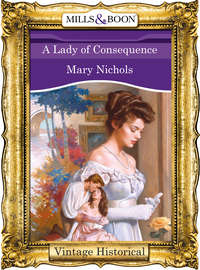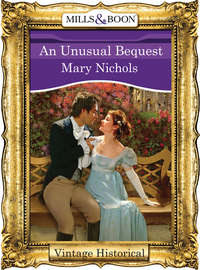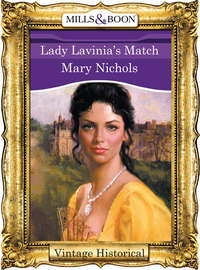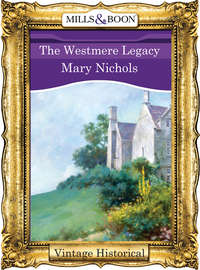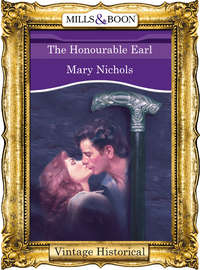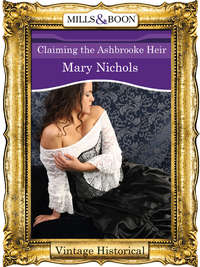
Полная версия
Runaway Miss
They parted on the corner of Mount Street and Alex strode down its length to the house on the corner of Park Lane where he was staying with his aunt, Lady Augusta Banks. He was very fond of his aunt, but he knew she had been asked by his mother to help him find a wife and she was determined to discharge that commission to the best of her ability. Already she was planning to put him in the way of every unmarried young lady in town, but searching for a life partner in that cold-blooded way went so much against the grain he had not been co-operative. It was why he had gone to Brooks’s, in order to escape yet another soirée, although he had promised to escort her to Lady Melbourne’s. There were often men in government in her ladyship’s drawing room and he had a mind to sound some of them out about a pet project of his.
He wanted to do something to help discharged soldiers coming home from the war without employment, which had been on his mind even before he became the new Viscount. It was employment they needed, not charity, and his idea was to set up workshops and small manufactories and provide them with tools so that they could make their own way and provide for their families. He could not do it alone, which was why he wanted to talk to men with influence. If he took his place in the Lords, he might be able to make a noise about the scandalous way the men had been treated. They were in dire need, which was something that could not be said of a chit worth thirty thousand a year.
Nevertheless, it was a long time before he could sleep, though he blamed it on the noises in the street from the increased morning’s traffic in the road outside his window as the business of the day progressed.
Chapter One
Lady Emma Lindsay looked at herself in the mirror, not out of vanity but simply to assure herself that the gown she wore would pass muster. It was made in pale blue mousseline de soie, with tiny puffed sleeves, a deep boat-shaped neckline edged with a darker blue satin ribbon, and a high waist marked by the same ribbon. The skirt stopped just short of her feet and revealed satin slippers. Her maid had arranged her dark brown hair à la Grecque, held with a coronet of tiny silk flowers.
‘There! You look very fine indeed,’ Rose said, as she helped Emma on with her velvet cape, handed her a fan decorated with a woodland scene and stood back, smiling at the picture she had helped to create. ‘You will have all the eligibles falling at your feet.’
‘Too late, Rose, too late. I shall soon be one and twenty, almost at my last prayers.’ She was unusually tall, but then all the Lindsays were tall, so it was hardly surprising. What with her height and her age, she despaired of finding a husband, at least not one she could love for himself and who would love her for the woman she was. And that was the problem. It was not finding a husband because her dowry was enough to ensure that, but finding the one to set her heart beating faster. Did such a man exist?
Mama said love did not come into it and she should not consider it, that a fortune and a pleasant temperament were of far more use, which was strange considering Mama had married again less than two years after losing her first husband and Sir George Tasker had neither a fortune nor a pleasant temperament.
Emma had been preparing for her come-out in the spring of 1813, when her father, Earl Lindsay, died suddenly and threw her into deep mourning. Naturally her trip to London had to be cancelled, but in truth Emma, grieving for her dear papa, had been in no mood for frivolity and had been content to spend her time quietly in the country at Pinehill, the family home in Hertfordshire. But one morning a year later, woken by bird song and the sun streaming through her bedroom window, she had suddenly realised that spring had arrived and life was passing her by and she ought to do something about it.
Mama must have had the same thought, because later that day, she had suggested taking Emma to London for her delayed coming out. The Duke of Ranworth, her mother’s brother, had offered them the use of Ranworth House in Hanover Square and they had done the rounds, attending balls and tea parties, but in the end it had not been Emma who found a husband but the dowager herself, though calling Mama a dowager was a jest, considering she had not been above forty at the time and still comely.
‘Lady Emma, that’s just the right age to be,’ Rose said, answering her last comment. ‘Though you are still young and beautiful, you are past the age of being thought an empty-headed schoolgirl that no one need take seriously. Some gentlemen would value your maturity.’
Emma laughed. ‘Thank you, Rose. What would I do without you? It is ridiculous when you think that a lady is not expected to dress herself, to do her own hair, or allowed to go out alone. But it is not only the dressing and looking after my clothes I value you for, it is having someone to talk to. I can say anything I like to you.’
‘My lady, I am sure you would manage.’ She paused and then took a deep breath before going on. ‘My lady, I have to give notice. My mother is having another baby and she needs me to look after the other little ones. There are seven now.’
Emma sank down on to the bed and stared up at her maid, who had been part of her life ever since she could remember. Rose had been a parlour maid at Pinehill, but as soon as Emma had become old enough to have a maid of her own, the girl had been promoted to lady’s maid. She was more than a servant, she was a friend. ‘Oh, Rose, of course you must go, but I shall miss you terribly. How long do you think you will be away?’
‘My lady, my mother is almost past childbearing age and this time she has found it very difficult carrying. I think she will need me to stay. I am sorry, my lady, truly I am. I do not want to leave you, but I must.’
‘I understand, Rose, of course I do.’ How selfish men were, Emma decided, determined to have their conjugal rights no matter what the consequences to their poor wives, but she did not say it aloud because she knew Rose loved her father—besides, it was not considered a suitable subject for a young unmarried lady to air. ‘When will you go?’
‘At the end of the week if that is convenient to you, my lady.’
‘My convenience is not important, Rose, I would never keep you from your mother. Go and look after her, I shall manage.’ She stood up. ‘Now, I must be off or we shall be late.’
Hurrying downstairs, Emma found her mother and Sir George waiting for her in the drawing room. Her mother, in a becoming gown of rose-pink taffeta, was looking unhappy, her face pale and eyes bright with unshed tears. Sir George, arrayed in a mulberry evening coat, an embroidered waistcoat, white silk breeches and silk stockings, was standing with his back to the hearth, his mouth set in a thin line of annoyance. There was a tension in the air, which immediately communicated itself to Emma.
‘About time too!’ Sir George said.
‘Goodness, child, whatever do you do up there to take so long to dress?’ her mother asked more mildly. She had once been upright and sprightly, but age and being cowed by her demanding second husband seemed to have diminished her.
‘I’m sorry, Mama, but I was talking to Rose. She wants to leave.’
‘Why? Whatever have you done to her?’
‘Nothing, Mama. She has to go and look after her brothers and sisters. Her mother is enceinte again.’
‘Well, there’s nothing to be done about it tonight,’ Sir George snapped. ‘You can send her packing in the morning.’
‘In the morning?’ Emma queried. ‘She is prepared to stay until the end of the week.’
‘No doubt she would like to, but it is my experience that servants under notice are worse than useless; they do no work, undermine the morale of the others and use every opportunity to steal…’
‘Rose is not like that,’ Emma protested. ‘She is honest and loyal.’
‘So you may think, but it is my rule that when a servant expresses a wish to leave, they are turned off immediately.’ He turned to his wife. ‘You will see she goes tomorrow. Now, the carriage is waiting. If we are not careful, we shall be the last to arrive and I particularly wanted to be there on time. There is someone I wish you to meet.’
‘Oh?’ Had he tired of waiting for her to accept an offer of marriage and found a husband for her? She waited to be enlightened.
‘Lord Bentwater.’
‘I do not think I know the gentleman.’
‘No, of course you do not or I would not be going to the trouble of introducing you.’
‘And what am I to make of this gentleman?’ She spoke coolly because she would not let him intimidate her as he intimidated her mother; if he expected her to fall into the arms of one of his disreputable friends, then he was going to be disappointed. She was not so desperate to marry that she would accept anyone in breeches. In fact, she was not desperate at all. Her mother’s miserable second marriage was enough to put anyone off.
‘You may make of him what you will, miss. What is more to the point is what he makes of you. Come, now, the horses will be growing restive.’ Followed meekly by his wife and an exasperated Emma, he set off down the hall, where the front door was opened by a liveried footman. A few short steps and he was at the carriage where he stood to one side as one of the grooms opened the door for the ladies to enter. Sir George seated himself opposite them and gave the order to proceed.
Although Almack’s was almost certainly the most exclusive club in London, it could hardly be called grand. Lit by gas, the ballroom was enormous, made to look even larger by the huge mirrors and a series of gilt columns. Other smaller rooms were used for supper and cards. The Patronesses who presided over the weekly balls during the Season made sure only the best people attended and that everyone behaved themselves. It was here young ladies were paraded before the eligible bachelors in the hope of finding a husband. Emma thought it unbearably boring and could not understand why her stepfather should suddenly take it into his head to attend. Except for that hint about someone he wanted her to meet. She was curious, but not hopeful.
As soon as they arrived Sir George disappeared in the direction of the card room and Emma and her mother wandered into the ballroom, where the sumptuous gowns of the ladies and the richness of the gentlemen’s coats formed a shifting rainbow of colour as they walked and gesticulated and preened themselves between dances. Spotting Lady Standon and her daughter, Harriet, they crossed the room to join them.
Harriet, a year younger than Emma, had recently become engaged to Frederick Graysmith, lawyer and Member of Parliament. He was likeable enough, but there seemed to be no fire in him. He would be safe but dull as a husband. Emma decided she wanted more than that. She wanted excitement and passion and a little something extra, though she could not define it. All she knew was that she would recognise it when it came. If it came. And if it did not, would she be able to settle for second best? She had a dreadful feeling that her stepfather was about to try to force a match on her and, if Lord Bentwater was anything like Sir George, she knew she would not like him.
‘Emma, I had no idea you would be coming tonight,’ Harriet said, her brown eyes bright with excitement. She was dressed in buttercup yellow, which contrasted well with her dark hair.
‘It was Sir George’s idea,’ she said. ‘He says there’s someone he wants me to meet and it must be important, for he insisted on buying me a new gown for the occasion.’ She looked round to see her mother deep in conversation with Lady Standon and lowered her voice. ‘We had such a rush to find something in the time available.’
‘It is very becoming,’ Harriet said, stepping back to appraise her friend. ‘You mean he is matchmaking?’
‘If he is, I cannot think what is behind it. I’m not sure I shall like it.’
‘Being married? Oh, surely you do not mean to be an old maid.’
‘It would be better than enduring an unhappy marriage, don’t you think? Once the deed is done, there’s no going back on it.’
‘I know that. But why should your marriage be unhappy? I set my heart on Freddie from the moment I met him and I know we shall deal well together.’
‘Then I wish you happy.’
‘Oh, I am sure I will be. The wedding is to be in June. I know it is very soon, but we have to be back from our wedding tour by the time Parliament reconvenes after the summer recess. You will be one of my attendants, won’t you?’
‘I shall be delighted, if Mama says I may.’
‘I would be even happier if I thought you were suited too. Do take advantage of the dancing. Almost every eligible in town is here. I am sure if you tried you could find someone.’
Emma laughed. That seemed to be all that mattered: the thrill of the chase, the announcement of the engagement and later the wedding with half the haut monde in attendance. But that was only one year—what about all the years afterwards, the children, the problems of motherhood, the steadily growing older? If the man you had married was the wrong one, it would be purgatory. ‘Oh, I am sure I could, but how would I know he was not after my fortune?’
‘Does that matter, if he is in every other way suitable?’
‘Tall, you mean.’ It was said with a laugh.
‘Yes, but more than that, surely? He must be amiable and considerate and have no bad vices, like womanising and gambling.’
‘How right you are, especially about the gambling. I could never marry a man who gambled, however suitable he might otherwise be.’ It was Sir George’s gambling that was the cause of most of her mother’s distress and that had entrenched in her a deep abhorrence of the vice, for vice it was. ‘But do you know of such a paragon?’
‘No, except Freddie, of course. But no doubt he has a friend…’
‘Don’t you dare!’
‘I was only trying to help.’
‘I know you were.’ Emma was contrite. ‘I did not mean to hurt your feelings, but I am not going to allow myself to be thrown to the wolves without a fight.’ She wasn’t thinking of Freddie’s friend so much as her stepfather. Just what was his game? He had never shown the slightest interest in her before, except to complain to her mother that she was too lenient with her.
‘Why must you fight?’
‘Because that’s my nature. Give me a challenge and I will rise to it. Tell me I must do something and I will refuse, tell me I cannot and I will most decidedly attempt it.’
‘Then I pity any husband of yours and perhaps I shan’t ask Freddie to introduce you to his friend after all. He would not thank me.’ She paused and nodded towards a young man making his way towards them. ‘Here comes Freddie, so I’ll leave you to enjoy yourself.’
Emma danced with several young gentlemen, none of whom set her heart racing, but she was honest enough to admit she did nothing to encourage them and they must have found her extremely dull. It was not like her to be so ungracious, but she could not concentrate on her partners when her mind was filled with the prospect of meeting Lord Bentwater. Who was he? What was he like? What was to be done if she took him in aversion? Perhaps, after all, he would be young and attractive and she was worrying for nothing. Or perhaps he would not turn up.
Her latest partner took her back to where her mother sat, bowed to them both and disappeared. ‘Who was that?’ her mother asked. ‘It was not Lord Bentwater, was it?’
Emma turned towards her in surprise. ‘Have you not met him?’
‘No.’
‘Then what is your husband about? Surely he has confided in you?’
‘He wishes to see you settled. As I do, dearest.’ It was said quietly, but Emma knew that her mother was not at all happy about it.
‘Am I to have no say in the matter at all?’
‘Oh, Emma, please do not be difficult. George tells me the gentleman is in every way suitable…’
‘Do you know, Mama, I cannot help wondering what Sir George is expecting to gain by it.’
If her mother intended to enlighten her, she did not do so because Harriet returned on Freddie’s arm and after he had bowed and left them, they sat chatting about the young men who were present, none of whom matched up to Freddie in Harriet’s eyes. As for Emma, she could not take any of them seriously. They were either dressed in the exaggerated fashion of the tulip, too young, too short or too old. Was Lord Bentwater among them and, if so, which was he?
‘Harriet, do you know who that man is, talking to my stepfather?’
‘I believe his name is Mr Jeremy Maddox. Don’t tell me he has taken your fancy.’
‘Goodness, Harriet, you do not think I have developed a tendre for someone I have only seen at a distance, do you? And he’s a dandy if ever I saw one. I was curious, that’s all. I thought he might be Lord Bentwater.’
Harriet laughed. ‘Good heavens, no! Why did you think it was him?’
‘I didn’t, particularly. My stepfather is set upon introducing me to Lord Bentwater and I am expected to be amiable. I am curious to know what he looks like…’
‘Bentwater! Oh, Emma, he does not expect you to marry that old roué, does he? He is fifty if he is a day and has gone through three wives already and not one has managed to produce an heir. I hear he is desperate. You cannot possibly consider him.’
‘Then I shan’t.’ She spoke firmly, but they both knew it would not be as easy as that. Perhaps Harriet had been exaggerating or perhaps there was more than one Lord Bentwater.
She realised her friend had not been exaggerating when her stepfather tapped her on the shoulder a little later in the evening. ‘Emma, may I present Lord Bentwater. Bentwater, my stepdaughter, Lady Emma Lindsay.’
‘My lady, your obedient.’ He made a flourishing leg, bowing low over it, giving her time to appraise him. He was taller than she was by an inch, but that was all she could find in his favour. He was thin as a lathe, with sharp features and black brows. His coat and breeches were of black silk, his black waistcoat was embroidered with silver; his calves, in white silk stockings, were plumped out with padding. Emma was reminded of a predatory spider and shivered with a terrible apprehension. Surely her stepfather did not expect her to marry this man?
He was looking her up and down, taking in every detail of her face and figure, and she longed to tell him she was not a brood mare being trotted out for his inspection, but knew that would be unpardonably rude; for her mother’s sake, she resisted the impulse and met his gaze unflinchingly. She curtsied. ‘My lord.’
He offered his hand. ‘Shall we dance, my lady?’
She accompanied him on to the floor where they joined an eightsome. The steps were intricate and they were never close enough to permit a conversation, but she was aware as she moved up and down, across and sideways, that he was looking at her all the time, even when he was executing steps with another of the ladies. How uncomfortable he made her feel! At the end of the dance, she curtsied and he bowed and offered his arm to promenade.
‘My lady, you must learn to unbend,’ he said in a low voice. ‘You are as stiff as a corpse and I would not like to think you are unhappy in my company.’
‘My lord, I am neither happy nor unhappy and as the dance has ended, you do not have to endure my company any longer.’
‘There, my dear, you are wrong. It is my earnest wish that we shall be often in each other’s company in future. Every day. Has your papa not told you of my intent?’
‘My father, my lord, is dead. And if you refer to my mother’s husband, then, no, he has not.’
‘No doubt he left it for me to do so after we had spoken together.’ When she did not reply, he went on with an oily smile. ‘You are a haughty one, to be sure, but that can be made a virtue, so long as your haughtiness is aimed at those beneath you and not your husband…’
‘My lord, I have no husband.’
‘Not yet. But the deficiency may soon be rectified. The details have yet to be settled with Sir George, but I think you understand me.’
‘You are offering for me?’
‘Yes. The offer has been made and accepted.’
‘Not by me, it has not.’
‘That is by the by. First things first. I have received the proper permission from your guardian to approach you and I shall call on you tomorrow when we will tie the thing up nice and tight.’
She stopped and turned to face him, drawing herself up and taking a deep breath. ‘Lord Bentwater, I am aware of the honour you do me, but I must decline. We should not suit.’
He threw back his head and laughed so that one or two people close by stopped their chattering to turn towards them. ‘You suit me very well and it suits Sir George to give you to me…’
‘Give me?’ She was shaking with nerves and seething with anger. How could he assume she would meekly give in? He was a dreadful man. He was older than her stepfather, he had small currant eyes and bad teeth, and his manner was arrogant and self-satisfied. The very idea of being married to him repelled her. ‘Why does it suit Sir George?’
He drew his lips back over his yellow teeth in a mockery of a smile. ‘Let us say that he has his reasons for wishing to accommodate me.’
Emma realised he had a hold over Sir George and she guessed it was something to do with money. She was being sold! ‘My mother will never sanction such a thing.’
‘Lady Tasker will obey her husband as every good wife does. Now, my dear…’ Again that awful smile. ‘Let us not quarrel. I shall not be a bad husband, not if you please me…’
‘But you do not please me, Lord Bentwater. I bid you good evening.’ She broke away from him and went to sit beside her mother. ‘Mama, you wanted to know which of the gentlemen was Lord Bentwater and now I can point him out. He is that black spider over there, laughing with Sir George, no doubt over me. He tells me he has bought me—’
‘Bought you, child?’
‘Yes, bought me. I do not know what he has given, or promised to give, your husband for me, but I tell you now, nothing on earth will persuade me to take that rude, arrogant scarecrow for a husband.’
‘Oh, Emma,’ her mother said with a heavy sigh. ‘There will be the most dreadful trouble, if you do not.’
‘Why? What has Sir George said to you?’
‘He says he cannot afford to cross Lord Bentwater, that the man has it in his power to ruin us, though George will not tell me how or why. All he says—and he says it over and over again—is that without this match we will live in penury, his reputation will be ruined and we won’t be able to lift our heads in society again. I think it must be a gambling debt, I can think of nothing else.’
‘Mama, surely it cannot be your wish that I marry that man?’
‘No, of course not. I have argued until I am spent, but George is adamant.’ Lady Tasker sighed heavily. ‘If only your papa were alive…’
‘You would not be married to Sir George Tasker, would you?’ Emma said with unanswerable logic. ‘Why did you marry him, Mama?’
‘I was lonely and in all my life I have never had to manage alone. My father, the late Duke, looked after me and my affairs until he handed me over to your father when I was seventeen and he carried on as my father had done. I never had to think of anything for myself and, when your papa died, I had no idea how to go on. Sir George was charming and understanding. Even now, when he is in a good mood…’ She stopped and gazed across the room where her husband was enjoying a jest with Lord Bentwater. ‘I dare not cross him.’
Emma gave up the conversation, knowing she would get nowhere with it. And now she was torn in two because it was obvious that if she was adamant in her refusal to marry Bentwater, her mother would suffer for it. Sir George would not beat his wife, he had too much pride for that, but there were other ways of punishing her: subtle verbal cruelty, forbidding her to receive her friends or call on them, taking away her pin money so that she could go nowhere, buy nothing, without petitioning him first. It had happened before when her mother displeased him and Emma loved her mother dearly and could not bear to think of her suffering in that way. ‘Mama, if you say I must, I must, but I shall do it with a heavy heart and I promise you I shall not be an obedient wife.’


